-
RESEARCH01-01-2018
Effects of health education in the elderly with mild cognitive impairment
Revista Brasileira de Enfermagem. 2018;71:801-810
Abstract
RESEARCHEffects of health education in the elderly with mild cognitive impairment
Revista Brasileira de Enfermagem. 2018;71:801-810
DOI 10.1590/0034-7167-2017-0032
Views0See moreABSTRACT
Objective:
to analyze the effects of health education on both cognition and depressive/anxiety symptoms in the elderly with Mild Cognitive Impairment (MCI).
Method:
this is a randomized and controlled clinical trial. Participants (n=22) were recruited from a specialized outpatient clinic, and assigned into two groups: a Health Education Group (HEG) (n=10) and a Control Group (CG) (n=12). The participants were evaluated before and after the intervention, which was composed of classes and dynamics. The intervention consisted of 20 meetings, over a period of five months. The assessment was performed by means of the Addenbrooke’s Cognitive Examination – Revised (ACER), the Mini-Mental State Examination to access participant’s cognitive state, and the Beck’s Scale to access depressive/anxiety symptoms. A Memory Complaints Scale (EQM) was also used. The analysis was carried out using the Student’s t test for paired samples.
Results:
the HEG group demonstrated an improvement in attention/orientation (p= 0,026), memory (p=0.001), language (p= 0.033), and ACE-R (p= 0.003). On the other hand, the CG did not present improvement.
Conclusion:
the results highlight the importance of non-pharmacological interventions in older adults with MCI to reduce cognitive deficits.
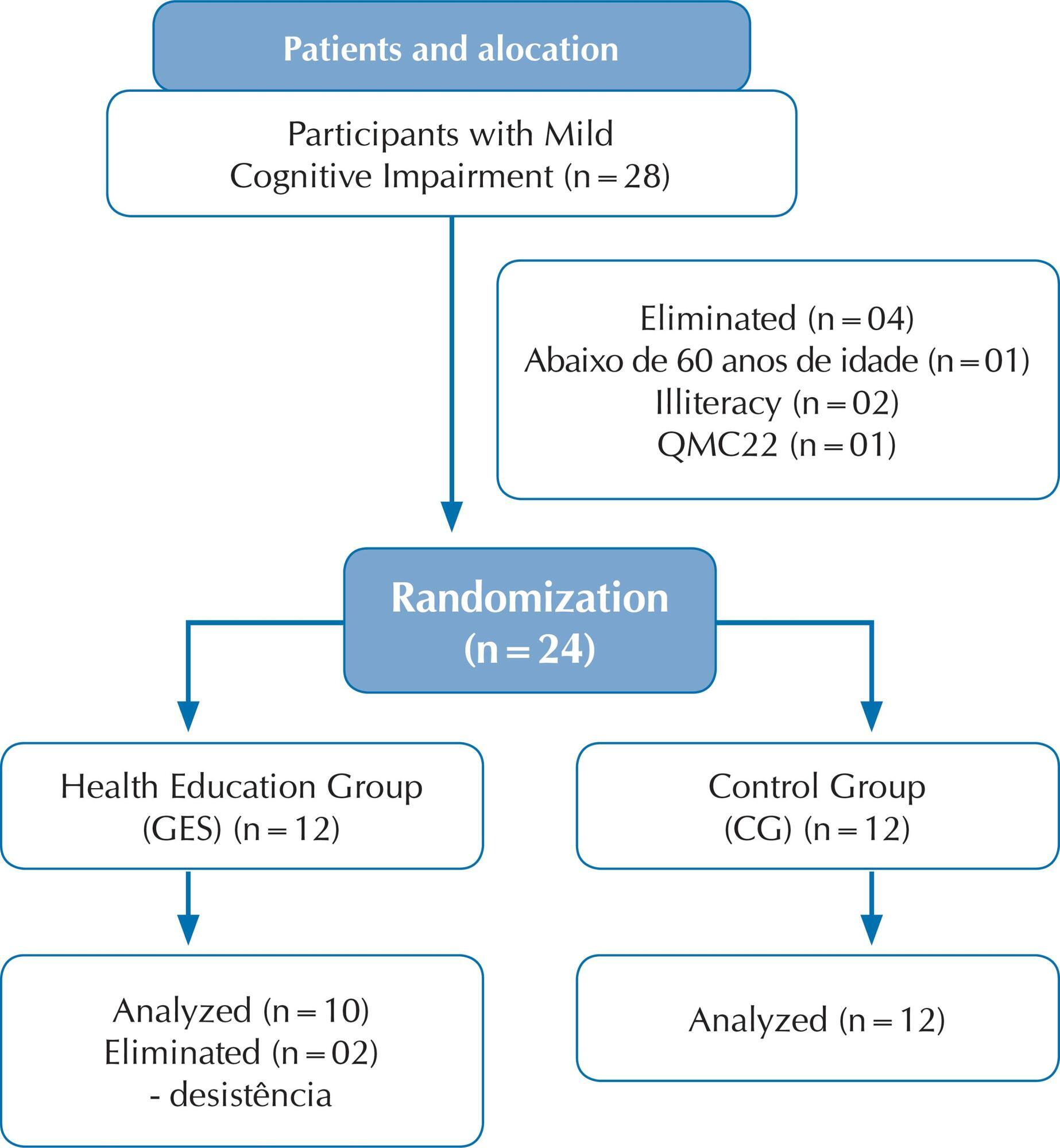
-
RESEARCH01-01-2018
Self-care of elderly people after the diagnosis of acquired immunodeficiency syndrome
Revista Brasileira de Enfermagem. 2018;71:793-800
Abstract
RESEARCHSelf-care of elderly people after the diagnosis of acquired immunodeficiency syndrome
Revista Brasileira de Enfermagem. 2018;71:793-800
DOI 10.1590/0034-7167-2017-0248
Views0See moreABSTRACT
Objective:
to characterize the seropositive elderly for the Human Immunodeficiency Virus and Acquired Immunodeficiency Syndrome (HIV/AIDS) in their socio-demographic aspects; to understand how the elderly take care of themselves from the diagnosis of HIV/AIDS.
Method:
Qualitative, descriptive, exploratory research conducted at a Voluntary Counseling and Testing Center with 10 elderly people receiving treatment for HIV/AIDS. The data were analyzed according to the content analysis.
Results:
Data show the elderly people’s lack of knowledge about HIV/AIDS transmission, the experience of being elderly and having HIV/AIDS, caring for oneself and life after diagnosis of HIV/AIDS in their daily lives.
Final considerations:
The diagnosis of HIV/AIDS seropositivity in the elderly generates a blend of feelings and fears that lead to food changes, adherence to treatment and the renunciation of daily and social habits, manifested as ways of self-care.
-
RESEARCH01-01-2018
Educational technology: a facilitating instrument for the elderly care
Revista Brasileira de Enfermagem. 2018;71:786-792
Abstract
RESEARCHEducational technology: a facilitating instrument for the elderly care
Revista Brasileira de Enfermagem. 2018;71:786-792
DOI 10.1590/0034-7167-2017-0129
Views0See moreABSTRACT
Objective:
To develop educational technology with caregivers of older people based on the needs, difficulties and concerns related to the elderly care expressed by the caregivers themselves.
Method:
Research of qualitative nature, with participant observation, based on concepts used by Paulo Freire. Data collection and analysis used the “World Cafe” methodology and the thematic content analysis, respectively.
Result:
The needs of these caregivers refer to their training and information on aging. The difficulties highlighted are deterrents to quality assistance to older adults, such as: insufficient resources, environmental factor and relationship with the family. The interests are evident in relation to the care and to its more subjective relationship.
Final considerations:
Educational technologies, printed matter and media, developed along with the caregivers, contribute to orientation and information of caregiver, population and professionals as facilitating instruments, regarding elderly care.
-
RESEARCH01-01-2018
Violence against the Brazilian elderlies: an analysis of hospitalizations
Revista Brasileira de Enfermagem. 2018;71:777-785
Abstract
RESEARCHViolence against the Brazilian elderlies: an analysis of hospitalizations
Revista Brasileira de Enfermagem. 2018;71:777-785
DOI 10.1590/0034-7167-2017-0139
Views0See moreABSTRACT
Objective:
to identify the prevalence of physical aggression and neglect and abandonment in the hospitalizations of Brazilian elderly people for violence and assault from 2008 to 2013 and the association of these causes with socio-demographic variables related to hospitalization.
Method:
quantitative, descriptive, cross-sectional study with elderlies hospitalized for assault. Inclusion criteria: to be 60 years old or over, to have been hospitalized in the Unified Health System (SUS) for assault or neglect and abandonment, between 2008 and 2013. The data were collected in February 2016, in Datasus database and descriptive and inferentially, using the Chi-square distribution, in the Epi Info 3.5.4 program.
Results:
the prevalence of hospitalizations due to assaults and violence prevailed among 60 and 69 years old men in the public sector. For abandonment and neglect, there was a higher prevalence in women, over 80 years old, in the public sector.
Conclusion:
nurses must be able to identify and prevent violence against the elderly.
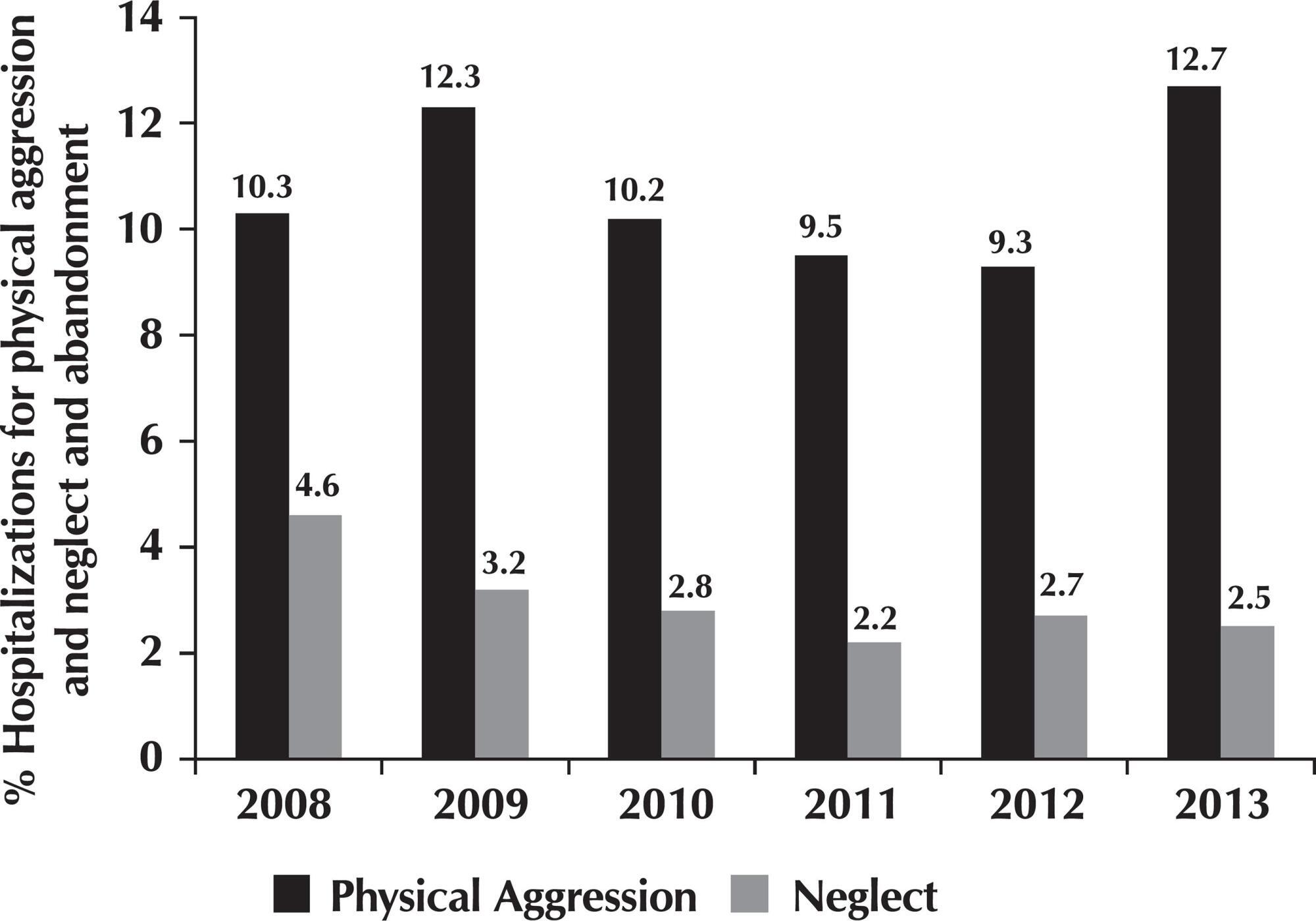
-
RESEARCH01-01-2018
The meaning of religion/religiosity for the elderly
Revista Brasileira de Enfermagem. 2018;71:770-776
Abstract
RESEARCHThe meaning of religion/religiosity for the elderly
Revista Brasileira de Enfermagem. 2018;71:770-776
DOI 10.1590/0034-7167-2017-0120
Views0See moreABSTRACT
Objective:
To understand the meaning of religion/religiosity for the elderly.
Method:
A qualitative, phenomenological study, based on Martin Heidegger. Thirteen older women registered in an Urban Social Center of Salvador, Bahia, Brazil aged between 60 and 84 years participated in the study. The collection of testimonies was carried out from November 2013 to May 2014 through phenomenological interviews.
Results:
Hermeneutics has unveiled the unit of meaning: Meanings of religion/religiosity in the daily life of the elderly. Religion/religiosity offers comfort and well-being to the elderly person, helping to overcome changes arising from the aging process.
Final considerations:
The nurse, while providing care, should expand his/her vision in relation to the subjectivity of the elderly, in order to understand that religion/religiosity gives meaning to their existence.
-
RESEARCH01-01-2018
Repercussions of hospitalization due to fall of the elderly: health care and prevention
Revista Brasileira de Enfermagem. 2018;71:763-769
Abstract
RESEARCHRepercussions of hospitalization due to fall of the elderly: health care and prevention
Revista Brasileira de Enfermagem. 2018;71:763-769
DOI 10.1590/0034-7167-2017-0069
Views0See moreABSTRACT
Objective:
To know the repercussions of the fall reported by the elderly and their caregiver during hospitalization in a public hospital in Florianópolis city from October to December 2014.
Method:
Exploratory research with a qualitative approach, conducted by depth interviews with 16 participants, the eight elderly were hospitalized for falls and eight elderly caregivers. Data analysis were performed through the Thematic Content Analysis.
Results:
It was evidenced the thematic axis: Faller Elderly supported by four thematic categories: Changes caused by Falls, I am a faller, I take care of me and Prevention of the Fall. The repercussions of the fall were evidenced in the impairment of the health condition, self-care and functional capacity. We observed the naturalization of the phenomenon and the passivity with the harmful consequences of the event.
Final Considerations:
The fall is valued the more negative its repercussion, such as the need for hospitalization and surgery. Managing the vulnerability of the elderly, especially in primary care, evaluating their comorbidities and their internal and external environment, will minimize unfavorable consequences and the social and financial cost of hospitalizations.
-
RESEARCH01-01-2018
Suicidal ideation and attempt of older women in Northeastern Brazil
Revista Brasileira de Enfermagem. 2018;71:755-762
Abstract
RESEARCHSuicidal ideation and attempt of older women in Northeastern Brazil
Revista Brasileira de Enfermagem. 2018;71:755-762
DOI 10.1590/0034-7167-2017-0413
Views0See moreABSTRACT
Objective:
to associate the life experiences of older women from the Northeast of Brazil with their suicidal ideation and attempts.
Method:
Qualitative study with fourteen older adults from Piripiri (PI), Teresina (PI), Fortaleza (CE) and Recife (PE) who were interviewed between November 2013 and July 2014. The organization of data originated the themes: experiences of abuse throughout their lives; marital fractures and social isolation; weakened motherhood.
Results:
The women were born and lived most of their life in the countryside, amid poverty and social exclusion. They had a history of abuse, physical and sexual violence, perpetrated by intimate partners and/or family members. They experienced social isolation, weakened emotional bonds and several suicide attempts.
Final considerations:
The life of these older women was affected by traumatic events that enhanced feelings of hopelessness, depressive symptoms and the absence of a plan for the future, making them consider suicide as a way to anticipate death.
-
RESEARCH01-01-2018
Validation of the Falls Efficacy Scale – International in a sample of Portuguese elderly
Revista Brasileira de Enfermagem. 2018;71:747-754
Abstract
RESEARCHValidation of the Falls Efficacy Scale – International in a sample of Portuguese elderly
Revista Brasileira de Enfermagem. 2018;71:747-754
DOI 10.1590/0034-7167-2017-0497
Views0See moreABSTRACT
Objective:
to translate and adapt Falls Efficacy Scale – International (FES-I). To analyze the psychometric properties of the FES-I Portugal version.
Method:
psychometric study. Sample consisting of 170 elderly people residing in the Autonomous Region of Madeira. A two- part form was used (sociodemographic characterization and FES-I Portugal). The cross-cultural adaptation was performed and the following psychometric properties were evaluated: validity (construct, predictive, and discriminant), reliability (Cronbach’s alpha), and inter-rater reliability.
Results:
the results allow us to verify a dimension of less demanding physical activities and another of more demanding physical activities. The inter-rater reliability study was 0.62, with an interclass correlation coefficient of 0.859, for a 95% confidence interval. The internal consistency of the Portuguese version was 0.962.
Conclusion:
the validity and reliability of the FES-I Portugal are consistent with the original version and proved to be appropriate instruments for evaluating the “impaired walking” and “risk of falls” nursing diagnoses in the older people.
-
REVIEW07-29-2020
Frailty syndrome in the elderly: conceptual analysis according to Walker and Avant
Revista Brasileira de Enfermagem. 2020;73:e20190601
Abstract
REVIEWFrailty syndrome in the elderly: conceptual analysis according to Walker and Avant
Revista Brasileira de Enfermagem. 2020;73:e20190601
DOI 10.1590/0034-7167-2019-0601
Views0See moreABSTRACT
Objective:
To analyze the concept of “frailty syndrome” in the literature, according to the method proposed by Walker and Avant.
Methods:
It is a concept analysis, guided by the method proposed by Walker and Avant, made operational through an integrative literature review. The search in a scientific database was carried out using the descriptors: Frail elderly, syndrome, phenotype, geriatric assessment, and aging. The literary corpus comprised 66 studies. Results: The study found the antecedents and attributes (categorized as physical, sociodemographic, and behavioral/environmental) that integrate the signs and symptoms evidenced in the “frailty syndrome,” as well as the consequences of this concept. The variables were analyzed with emphasis on the conceptions that influence the frailty process of the elderly.
Conclusion:
The study demonstrated the complexity arising from the multifactorial genesis of the referred syndrome, emphasizing the specificities of the elderly’s frailty. However, we recommend conducting further research involving the phenomenon in question to understand the construct better.
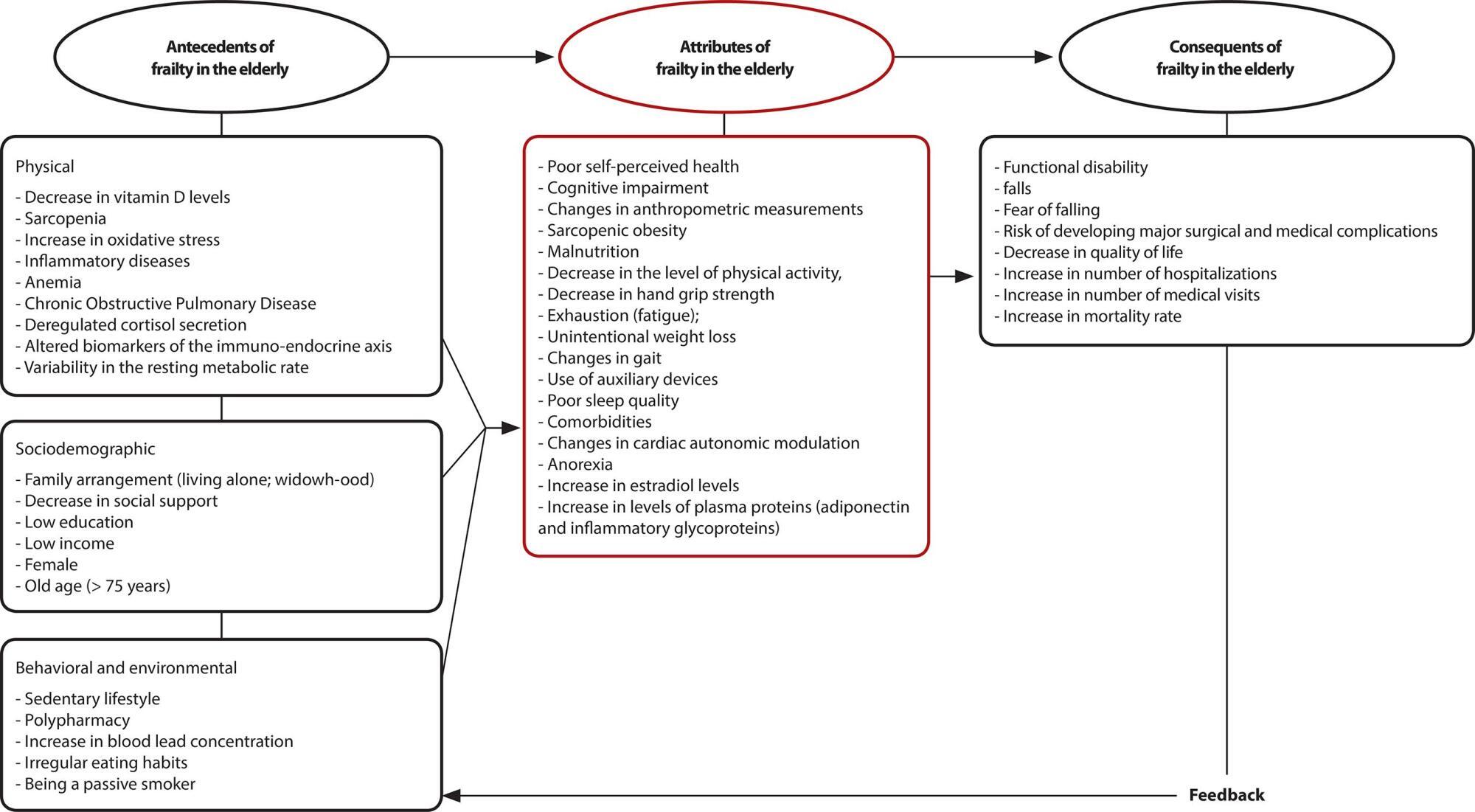
-
ORIGINAL ARTICLE09-16-2019
Tuberculosis: health care and surveillance in prisons
Revista Brasileira de Enfermagem. 2019;72(5):1304-1310
Abstract
ORIGINAL ARTICLETuberculosis: health care and surveillance in prisons
Revista Brasileira de Enfermagem. 2019;72(5):1304-1310
DOI 10.1590/0034-7167-2018-0260
Views0See moreABSTRACT
Objective:
To identify tuberculosis-related health care and surveillance actions in Prison Health Units.
Method:
Cross-sectional study, of quantitative, exploratory and descriptive character. We visited 13 Teams of Prison Health, and nurses and technicians were interviewed regarding epidemiological surveillance instruments, physical structure and materials.
Results:
Search for respiratory symptoms in admission was reported by 6 (46.2%) of the teams, and the smear microscopy was the most requested test. The Logbook of Respiratory Symptoms and the Logbook for Monitoring Tuberculosis Cases were used in 7 (53.8%) institutions. Two of them (15.4%) had a location for sputum collection and 1 (7.7%) had a radiographer. The Directly Observed Therapy was reported in 7 (53.8%) units.
Conclusion:
Health care actions related to the search for respiratory symptoms and Directly Observed Therapy should be expanded, as well as surveillance actions and recording in official documents of the National Tuberculosis Control Program.
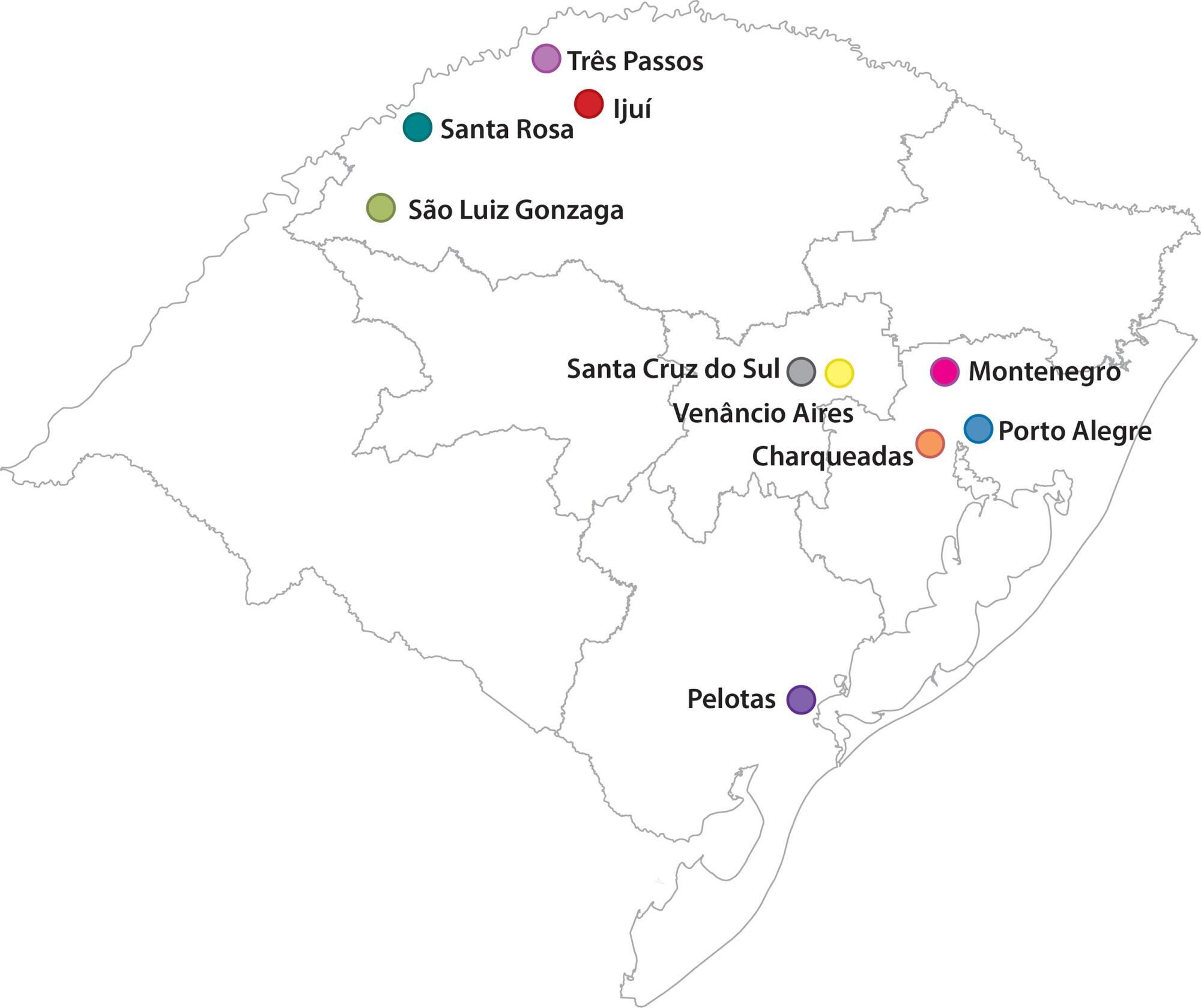
-
04-14-2021
COVID-19 patients in prone position: validation of instructional materials for pressure injury prevention
Revista Brasileira de Enfermagem. 2021;74:e20201185
Abstract
COVID-19 patients in prone position: validation of instructional materials for pressure injury prevention
Revista Brasileira de Enfermagem. 2021;74:e20201185
DOI 10.1590/0034-7167-2020-1185
Views0See moreABSTRACT
Objective:
to perform the content and face validation of a checklist and a banner on pressure injury prevention in patients in prone position.
Method:
this is a methodological study of content and face validation with 26 nurses with specialization. Professionals assessed the checklist and the banner in relation to clarity, theoretical relevance, practical relevance, relation of the figures to the text and font size. The Content Validity Index was calculated for each item, considering one with a value equal to or greater than 0.8 as valid.
Results:
all the actions described in the checklist and in the banner had a Content Validity Index greater than 0.80, with standardization of verbal time and esthetic adjustments in the banner’s layout, as suggested.
Conclusions:
the checklist and the banner were validated and can be used in clinical practice to facilitate pressure injury preventions in patients in prone position.
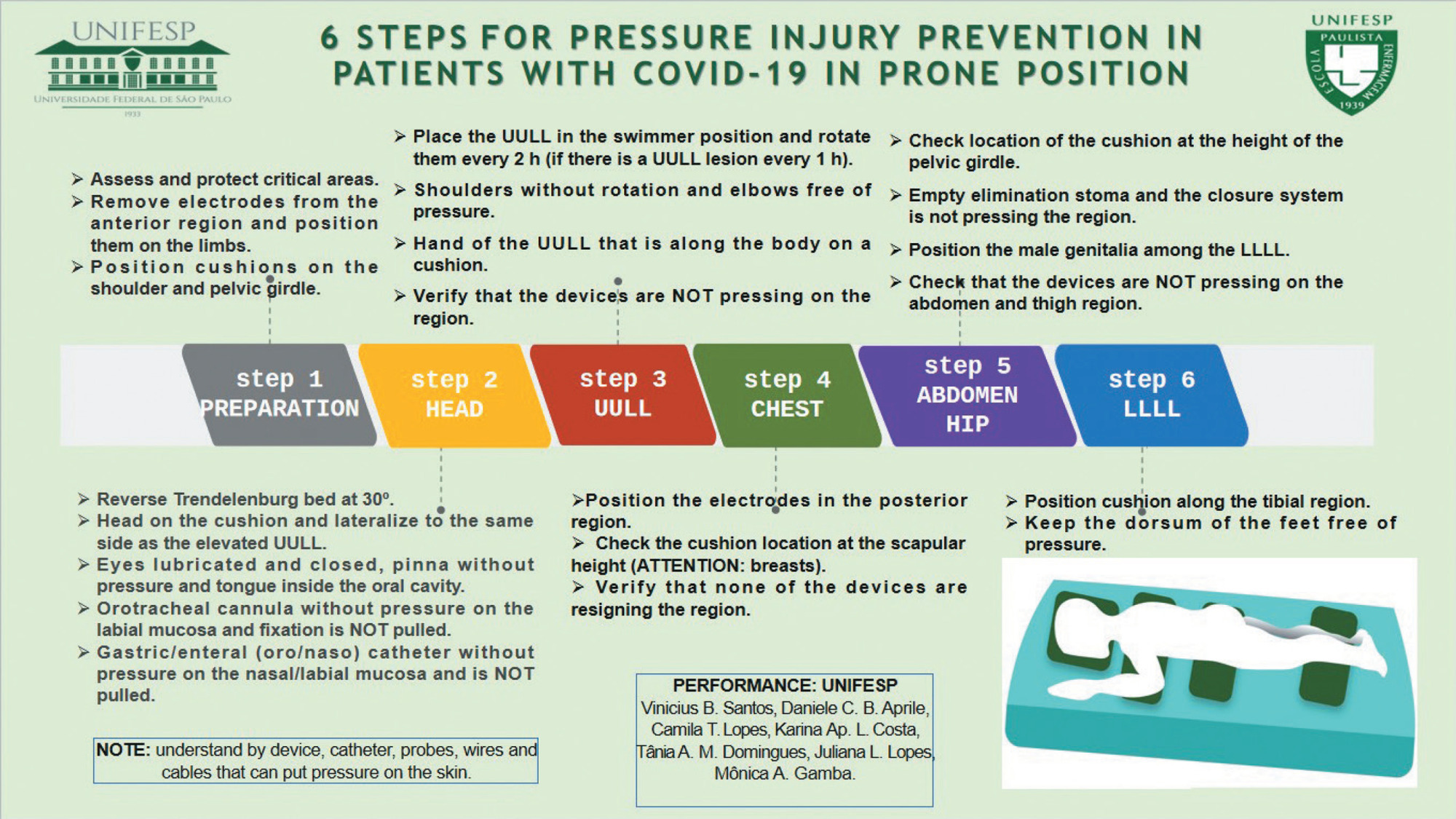
-
02-10-2020
Development of middle-range theories in nursing
Revista Brasileira de Enfermagem. 2020;73(1):e20170893
Abstract
Development of middle-range theories in nursing
Revista Brasileira de Enfermagem. 2020;73(1):e20170893
DOI 10.1590/0034-7167-2017-0893
Views0See moreABSTRACT
Objective:
To identify in the literature how Middle-Range Theories (MRT) are being developed in Nursing.
Method:
Integrative review on the databases Lilacs (Latin American and Caribbean Literature in Health Sciences), Scopus, Cinahl (Cumulative Index to Nursing and Allied Health Literature), Web of Science and PubMed portal, using the keywords middle range theory and nursing, as well its Portuguese correspondents (Lilacs), and the Boolean operator AND. The sample included 25 articles.
Results:
All articles presented concepts related to MRT. Most developed a synthesis picture. Some theories have formulated specific propositions, hypotheses, and names. Only 16 articles cited the methodological framework, while 22 used theories or models for theoretical foundation and 11 carried out literature reviews.
Final considerations:
The development of MRT included the presentation of fundamental concepts, synthesis, propositions, hypotheses and specific name. The MRT is recognized as a way of developing knowledge to guide the nursing practice.
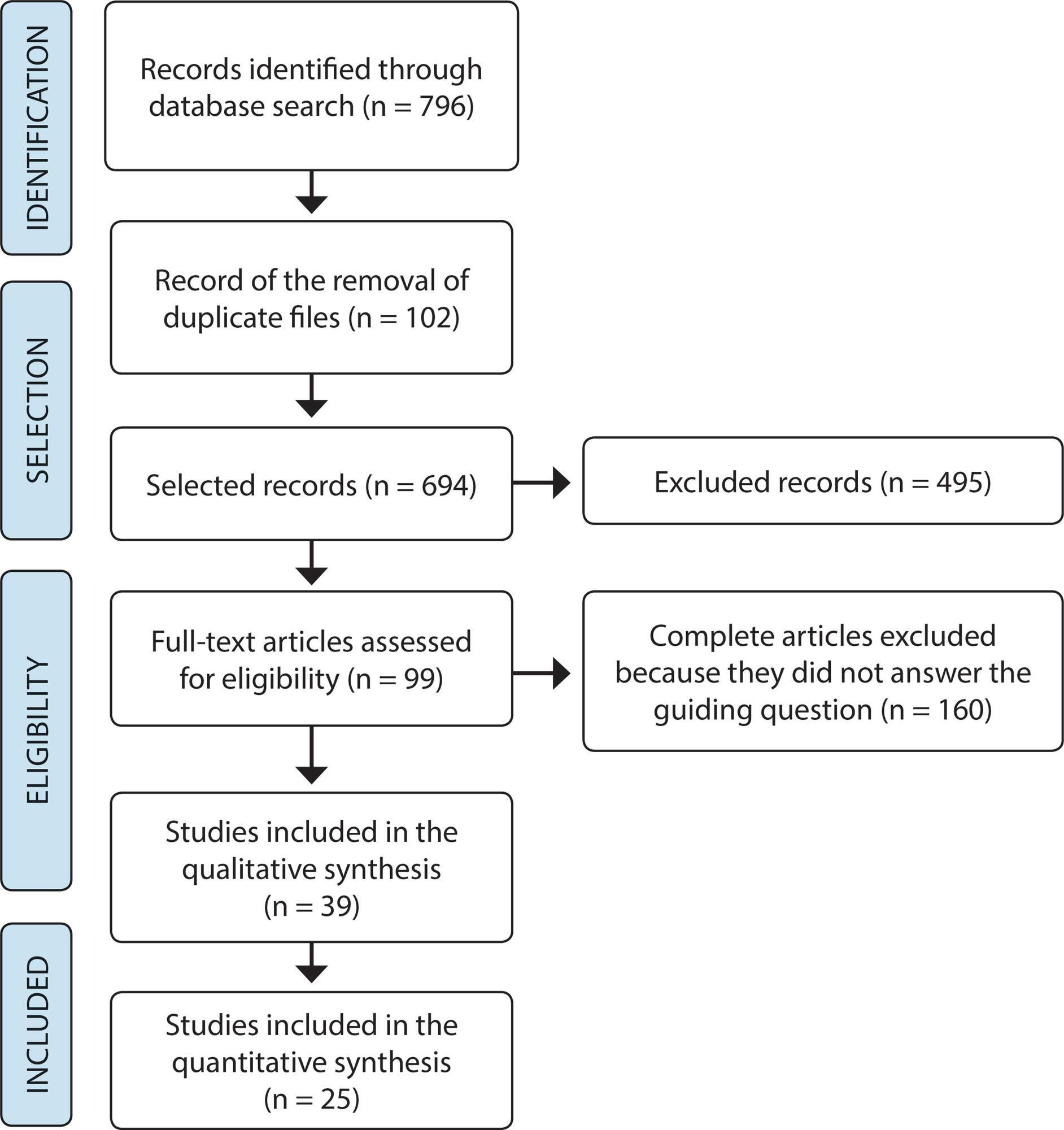
-
09-16-2019
Construct validation: coping with HIV/AIDS in Primary Health Care
Revista Brasileira de Enfermagem. 2019;72(5):1173-1181
Abstract
Construct validation: coping with HIV/AIDS in Primary Health Care
Revista Brasileira de Enfermagem. 2019;72(5):1173-1181
DOI 10.1590/0034-7167-2018-0734
Views0See moreABSTRACT
Objective:
To validate the construct and measure the trustworthiness of a questionnaire aimed at assessing HIV/AIDS coping actions developed by health professionals in Primary Health Care.
Method:
A methodological study carried out with 397 primary health care professionals in two municipalities in the Northeast region of Brazil. The construct validity was developed by the exploratory and confirmatory factor analysis, and the reliability analyzed by the reliability and reproducibility.
Results:
The validation determined six factors retention that composed the six domains of the questionnaire. Internal consistency was 0.91 and quality of the confirmatory analysis adjustment was 0.998 for Goodness of Fit Index. The domains presented Kappa values between 0.833 and 0.997.
Conclusions:
The final questionnaire was composed of 18 items and presented feasibility of application, and potential to evaluate actions for HIV/AIDS control in Primary Health Care.
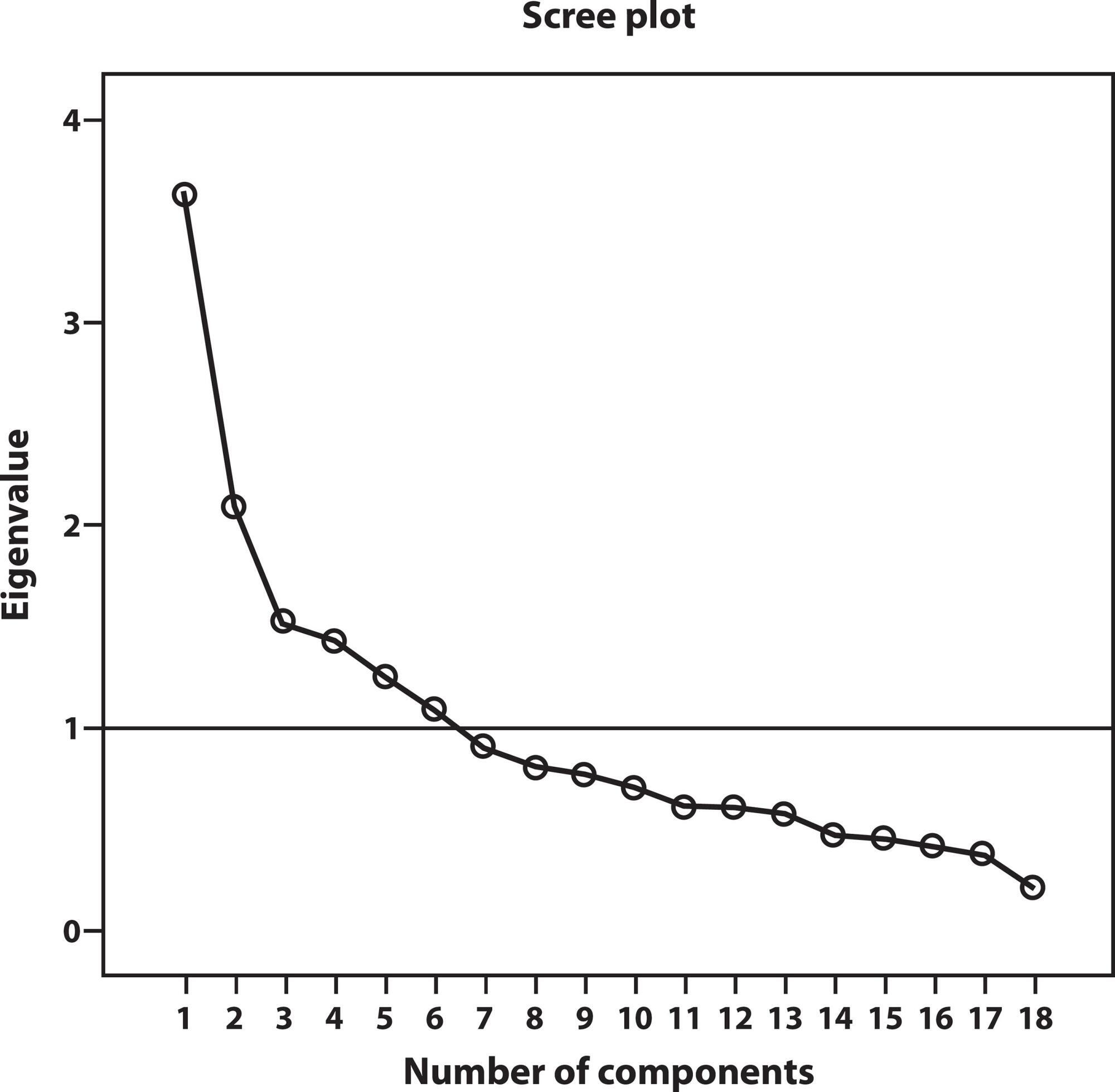
-
ORIGINAL ARTICLE02-10-2020
Stress and health risk behaviors among university students
Revista Brasileira de Enfermagem. 2020;73(1):e20180035
Abstract
ORIGINAL ARTICLEStress and health risk behaviors among university students
Revista Brasileira de Enfermagem. 2020;73(1):e20180035
DOI 10.1590/0034-7167-2018-0035
Views0See moreABSTRACT
Objective:
To analyze the level of stress and its relationship with health risk behaviors among university students.
Method:
Cross-sectional analytical study carried out at a higher education institution in Picos-PI. A total of 377 students were evaluated for socio-demographic and academic variables, stress profile, sleep quality, alcohol use, smoking habits and level of physical activity. The Statistical Package for the Social Sciences (SPSS), version 20.0 was used for data processing and analysis.
Results:
Sleep quality was poor for 65.3% of the subjects, and sleep disturbances were found in 17.0%. Stress was observed in 68.7% of the sample. Stress was associated with the following variables: gender, time in the institution, poor sleep quality.
Conclusion:
Most of the students evaluated present some level of stress associated with poor sleep quality, which is a risk to the quality of life of these individuals.
-
ORIGINAL ARTICLE03-24-2021
Self-care of people with intestinal ostomy: beyond the procedural towards rehabilitation
Revista Brasileira de Enfermagem. 2021;74(1):e20200088
Abstract
ORIGINAL ARTICLESelf-care of people with intestinal ostomy: beyond the procedural towards rehabilitation
Revista Brasileira de Enfermagem. 2021;74(1):e20200088
DOI 10.1590/0034-7167-2020-0088
Views0See moreABSTRACT
Objectives:
to interpret the self-care experience of people with intestinal ostomy registered in an ostomy program, based on the framework of the Social Model of Disability.
Methods:
qualitative exploratory research, with the participation of nine people with intestinal ostomy, based on the Social Model of Disability.
Results:
majority were elderly, married, male with colostomy due to colorectal neoplasia. The self-care of these people was analyzed in two thematic groups: “Interdisciplinary assistance needed for people with intestinal ostomy” and “Self-care for the rehabilitation of the person with intestinal ostomy”. It was proved that there was a need for a specialized health team, offering information on disabilities, teaching self-care and perioperative follow-up.
Final Considerations:
when the social barriers of physical disabilities are overcome in the context of assistance for health and life, self-care will go beyond the reductionist vision of procedural care, towards comprehensive care, favoring the achievement of rehabilitation and the quality of survival.
-
03-19-2021
Production and validation of educational technology on nursing care for syphilis prevention
Revista Brasileira de Enfermagem. 2021;74:e20190694
Abstract
Production and validation of educational technology on nursing care for syphilis prevention
Revista Brasileira de Enfermagem. 2021;74:e20190694
DOI 10.1590/0034-7167-2019-0694
Views0See moreABSTRACT
Objectives:
Validate script and storyboard of a video for educational intervention on nursing care for the prevention and management of syphilis.
Methods:
Methodological design study, with quantitative analysis approach. The content and appearance of the educational video script and storyboard was validated by a committee of experts on the subject and video. They were considered validated from the agreement of 78%, calculated by means of the Content Validity Index.
Results:
There were suggestions, which were analyzed; and, where relevant, the script and storyboard were changed. The degree of agreement among the expert judges on the subject obtained a Content Validity Index (CVI) of 100%, while, with the technical experts in video, all the questions in the educational material obtained the percentage above the recommended minimum of 78%.
Conclusion:
The validated video is an important technological production and could be used in the context of health care.
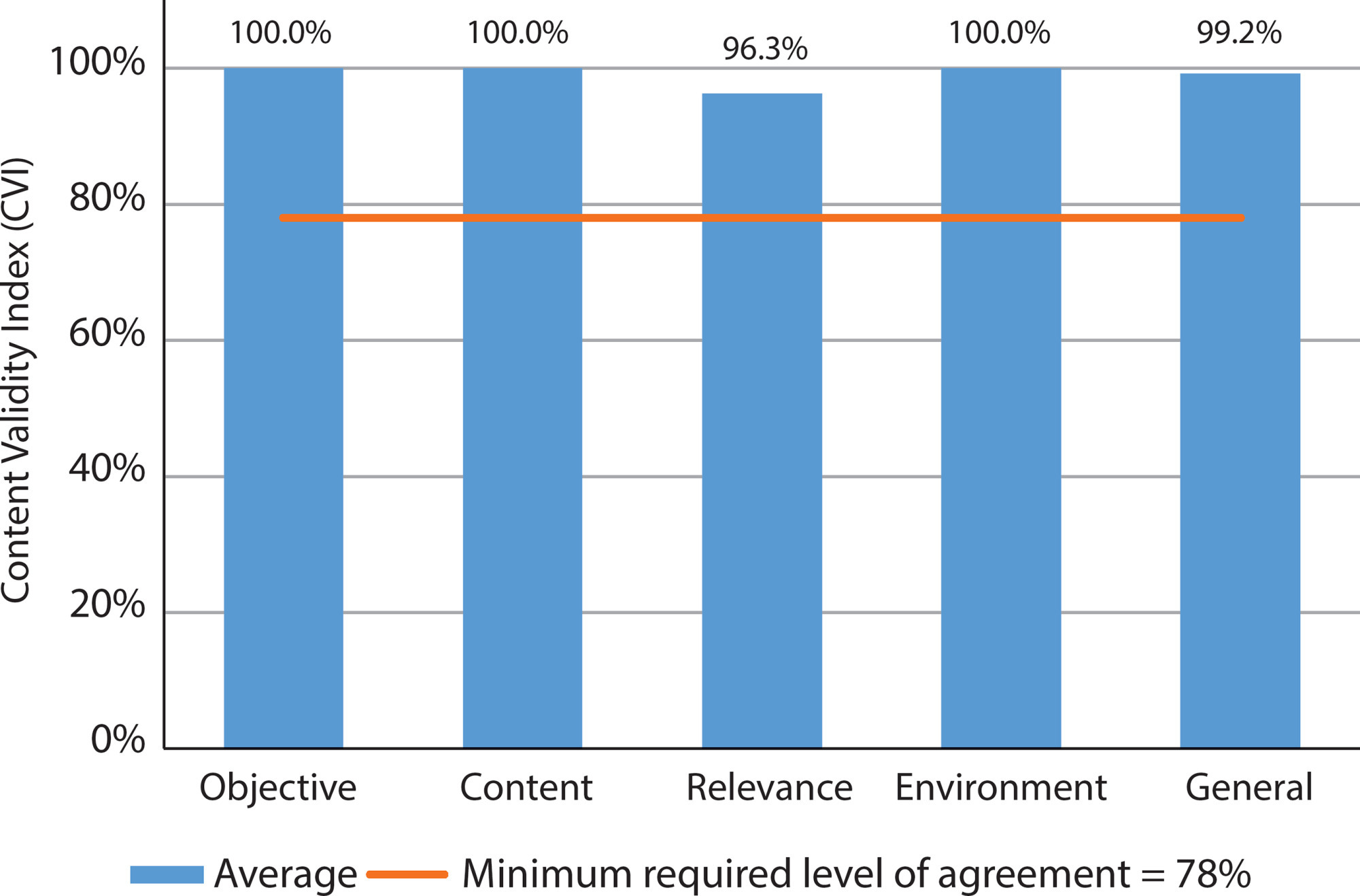
Search
Search in:
Nuvem de Tags
Adolescente (85) Atenção Primária à Saúde (239) COVID-19 (91) Criança (91) Cuidados de Enfermagem (269) Educação em Enfermagem (151) Educação em Saúde (139) Enfermagem (930) Enfermagem Pediátrica (86) Estudantes de Enfermagem (77) Estudos de Validação (131) Família (87) Idoso (208) Promoção da Saúde (99) Qualidade de Vida (104) Saúde do Trabalhador (86) Saúde Mental (145) Saúde Pública (82) Segurança do Paciente (150) Tecnologia Educacional (100)



